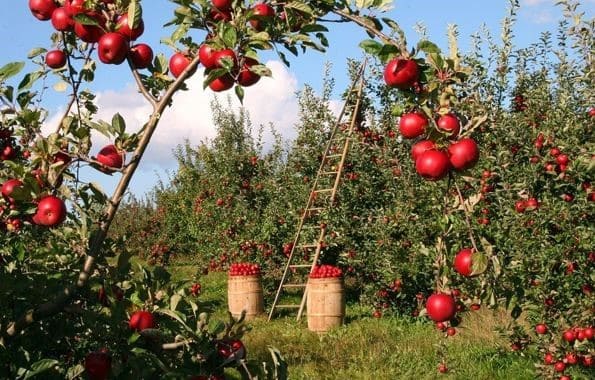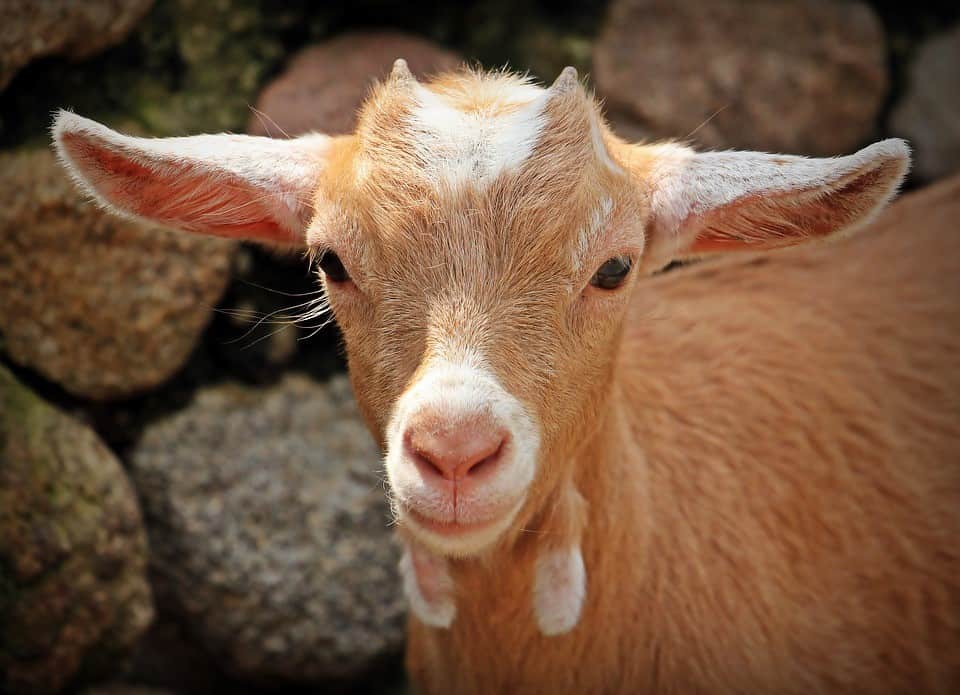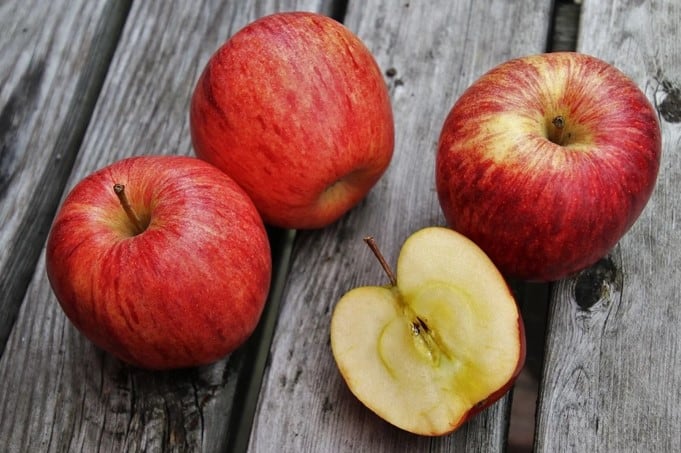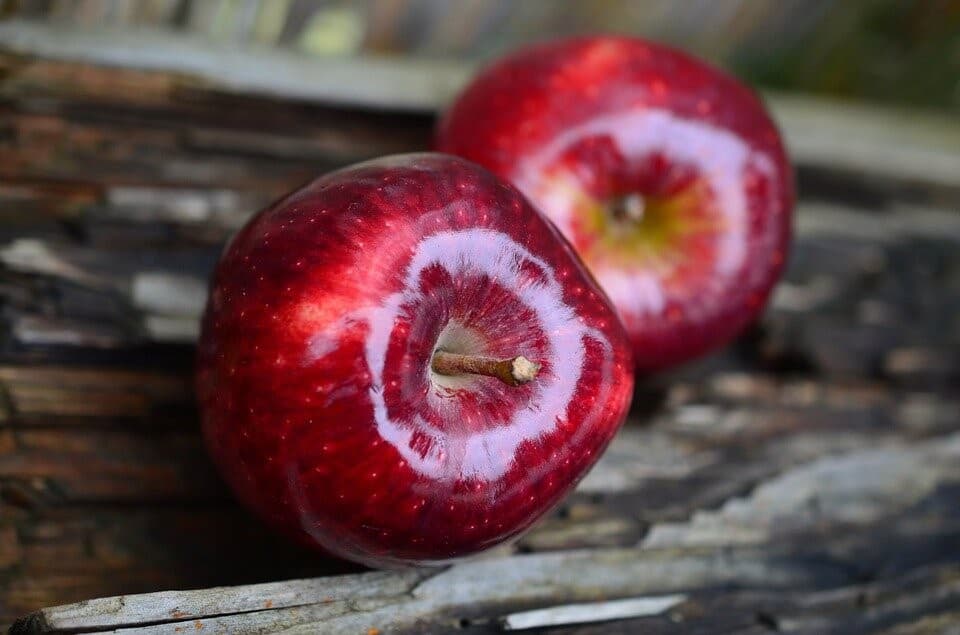Apples make for pretty healthy snacks, being rich in fiber and Vitamin C. They can be eaten whole, baked into a pie, or even cooked into scrumptious jam. How do they measure up for goats, though? Can goats eat apples?
Turns out goats love apples. Apples are rich in a whole heap of nutritional perks, on top of being very low on sodium and cholesterol. They can eat the peels and flesh just fine, but the seeds are a no-go due to being chock full of dangerous components. Rinse and clean apples you plan on serving them, and cut them into small pieces so they are easy to chew.
Apples have a lot to offer goats, and it might be in your best interests to serve them the fruit. Below are just a few reasons why they’re excellent picks for goat treats.
Can Goats Eat Apples?
Apple Health and Nutrition

Apples are best known for their Vitamin C and fiber content, but offer quite a bit more that goes underreported for the most part.
Vitamin C is a notable contributor to your body’s functionality, greatly assisting blood pressure regulation and the body’s healing processes. It also bolsters the immune system against disease. It’s also known to boost antioxidant levels and assist in the absorption of iron.
The latter is pretty important, as goat kids in confinement are known to be more at risk of iron deficiency than their wilder counterparts. The extra immune system assistance is also very welcome in confined conditions, as your animals will be quite close to one another and subsequently more at risk of catching communicable diseases.
The high fiber content in apples helps normalize bowel movement and lower cholesterol levels. Contrary to popular belief, goats actually have pretty sensitive digestive systems. As a result, throwing off their gut bacteria could lead to problems like diarrhea and eventual dehydration.
Ensuring they have high fibrous meals can help assuage those concerns. It also helps that apples are very rich in water – in fact, the fruits are 86% water! Feeding them to your goats will significantly lower their dehydration risk while bolstering their immune systems.
Apples also possess Vitamin K, which helps blood clotting. Some goats can be aggressive and even fight others, so this vitamin will be sorely needed. They also possess copper that aids red blood cell formation.
Similar to carrots, apples also score low in the glycemic index, which is a measure of how blood sugar rises when given certain food items. This puts the fruit at far less risk of throwing your goat’s gut microbes out of whack and actually helps them maintain that sensitive balance.
In summary, apples are great treats for your goats. Not only are they usually predilected to liking the fruit – a boon given their extremely picky natures – but it also provides them with the nutrition they’d often find lacking in other sources. This is especially critical when rearing them yourself.
Do Goats Even Like Apples?

Goats are picky eaters, but even they love apples. Goats sample a lot of food, which feeds into the common notion that they’d eat just about anything. They actually pick stuff out based on how good they’d be for their nutrition, and apples are pretty high up the goat’s choice tier list.
Apples are very energizing for goats, being filled with vitamins, carbohydrates, and even a small amount of protein. They don’t meet all of their dietary needs, though. Too many apples could lead to digestive issues, vitamin deficiencies, and just generally unbalance their diets.
Goats are pretty aggressive animals, so try to avoid feeding them communally. Goats will fight each other, and possibly you, with very little prompting. Adding another reason for them to do so would add to the challenges behind feeding them.
Some of your bigger goats might chase others off their shared feed. Don’t bother serving apples the same way, because they’ll develop a fonder taste for it than their usual fare.
Goats might also be biters. It’s not necessarily done to provoke or express agitation – sometimes it might even be done to play or communicate. It’s doubtful that you or your fingers would be very appreciative of that, so try to avoid hand-feeding them treats that are harder to stick out safely.
Apple Peels, Leaves, and Seeds

Goats can eat more than just apple flesh. The peel and leaves are fair game, though apple seeds warrant a bit more consideration on the matter.
Apple peels are nutrient heavy, with regular apples having far more Vitamin A, C, and K than their peeled counterparts. If you prefer peeling your apples before eating, it would be wise to give the skin to your goats to avoid waste. They’re usually fans of the taste.
Apple tree leaves are also surprising contenders for picky goats’ taste preferences. If you happen to own apple trees nearby, feel free to have them indulge. In fact, this even extends to the bark and branches of the apple tree. Goats are more than welcome to indulge, as the tree has more in common with their normal feed than the apples themselves.
Don’t extend the same luxury to baby goats though. Up until three months of age, kids can’t regulate their own eating and gleefully gorge themselves. This often leads to bloating issues, which your goat can’t burp out. Common symptoms of this include loss of appetite and restlessness, and can even lead to breathing issues and even death if left untreated.
The seeds aren’t fit for human consumption, but the level of toxicity isn’t the same for goats. Apple seeds contain cyanide and amygdalin, the latter of which decays into cyanide in the body. Serious damage would require about five pounds of hydrogen cyanide per day for a single goat.
While the risk isn’t extreme, the danger isn’t negligible. You can get away without removing the seeds once in a while, but strive to do so as often as possible.
How Often Should You Give Them Apples? How Much?
Goats are rather big animals and can manage with bigger treat portions, but don’t turn them into something they’d begin to seriously expect. It may be better to feed them apples every other day rather than what their bodies can technically manage.
Goats could neglect their own feeding habits while waiting for apples, which would lead to dietary deficiencies, general agitation, and more difficulty handling them. Don’t get them expecting apples because their memory coupled with sheer stubbornness can give you a massive headache tending to their needs.
Storing, Preparing, and Serving Apples
Storing
Apples can last for around four to five days on countertops but definitely prefer to be refrigerated to staunch ripening. Refrigerated apples can keep for up to a month in ideal conditions.
If you store apples on a countertop, keep them clear of other fruits as they might dampen the flavor or expedite the ripening process. Common culprits are onions, potatoes, bananas, and even other apples.
Their shelf life is directly tied to their skin thickness, so do bear in mind the type of apples you’ve got on hand. Thicker varieties like Ambrosia will easily outlast most common variants.
Preparing
It’s important to check if your apples are wax-coated prior to consumption. Wax coatings are usually applied to stretch apple shelf life and commercial desirability, but eating them will lead to adverse effects on your digestive system.
If your apples have been sourced nearby, this is less of a possibility. In case you have to deal with the wax coating, a combination of baking soda, vinegar, and warm water is effective at removal. Let simmer for five to ten minutes depending on the thickness of the wax. Finally, rub the fruit down with a dry, coarse towel.
You can serve apples unpeeled, but if you insist on doing so vegetable peelers make the process much more manageable. Start with the top and bottom ends, then work your way across.
They can also be served sliced. Simply de-core the apple, then store it away until needed. Apples should last for a few days without browning when refrigerated in an airtight container.
Serving
Apples can be served to your goats whole, which wouldn’t be very problematic. The seeds contain a small amount of cyanide that’s more fatal to humans than goats in that quantity. Bear that in mind and proceed as you would – we’d recommend de-seeding them anyways to be prudent.
They can also be given sliced and may be ideal for easier portioning. You could even spare yourself a few wedges to snack on. Their smaller size makes hand feeding your goats out of the question – stick to feeding bowls to keep your fingers safe.
Common Risks

Apples need to be introduced to your goat’s diet gradually. Their gut microbiome needs to adjust to the new additions, so serve them small portions for at least a week. Up their serving over time, but don’t go over a small apple a day – and try to go for less than that.
Wax coats are a pretty easy health hazard to miss. Not only could they trick you into possibly buying a subpar product, but they’ll wreak havoc on both you and your goats’ digestive systems. Just because a goat will try anything doesn’t mean it’ll be able to digest everything.
Bloating is also a big reason why we can’t feed too many apples to your goat. The apples will ferment in their gut, which in certain quantities can lead to excessive gas buildup. As little as 3% sugar in their body will lead to problematic bloating.
Even if apples don’t affect blood sugar levels as markedly as most fruits, goat sensitivity to sugar makes serving them too many apples a prohibitive choice.
This is especially problematic in young goats. Kids don’t know how to pace themselves and will likely suffer from bloating if you allow them to feast on apple tree parts or if you give them too many fruits. Don’t give any goats apples until they’re at least three months old.
Final Thoughts
Goats love apples, and everything – branches, leaves, and bark – can be eaten with no grievous consequences. Make sure to only feed your goats that know how to pace themselves. This is true for other food as well, such as watermelons. Otherwise, serious bloating, dietary deficiencies and a lot of other concerns will crop up. Don’t give apples to any kids, but other than that, apples are all-around amazing to give to your goats.

